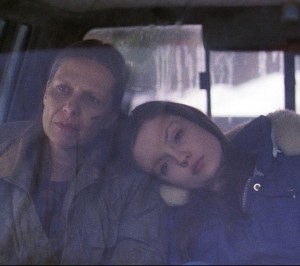Tribeca Reviews: The Bluebird That Stayed Behind
What happens when a stray bluebird doesn’t leave the cold woods of Northern Maine for warmer climes? Plenty; according to writer-director Lance Edmands, that “little mistake of nature has enormous consequences” for all the characters in Bluebird, Edmands’ debut feature in Tribeca’s current film festival.
Lesley, a school bus driver in Millinocket, Maine, is finishing one last inspection of the bus at the end of her route when she is distracted by the appearance of a lone bluebird. It seems like a fleeting, inconsequential moment, and she shuts up the bus for the night. Only in the first light of the next day, will she find out that Owen, one of her young charges inadvertently left aboard, is now in the hospital in a comatose state.
This is a serious business for everyone involved, especially Lesley, who must try to grapple with the overwhelming guilt of her actions. As played by Amy Morton, we feel the plight of a middle-aged woman who has been sleepwalking through most of her life. Everything she does, whether managing the daily rigors of being a bus driver or caring for her lumberjack husband Richard and teenage daughter Paula, is competent enough — but that’s it. In the press notes, Morton describes her fictional family as “almost falling asleep in a coma by trying to live a life without desires.” It’s as if these characters are caught in a frozen world, as if their sensory responses are on the verge of thawing out, but how?
Director Edmands, a Maine native, sees this as a typical New England disposition — “not to complain, not to talk about anything too much. There’s a lot of secrets and a lot of denial.” As for John Slattery, who plays Richard and also grew up in those environs, he admits, “you figured stuff out on your own and you got on with it…keep your eyes closed, or you’ll bleed to death.” Audiences who are mostly familiar with Slattery as the Emmy-nominated Roger Sterling on AMC’s Mad Men, will be surprised at his sensitive yet unsentimental portrait of a man trying to understand losing his grip on a dwindling job atop a tree feller truck and a deeply troubled spouse. His slight build and quiet demeanor in this part seem like casting against type but the choice punctuates man’s shrinking role amidst the immensity of the surrounding Great North Woods.
The effects of this unforgiving landscape are not lost on the supporting characters. Emily Meade as the daughter has an unspoiled freshness that she brings to the role, but she too is in danger of getting locked — like the windup snow globes she sells in her retail job — in the icy universe she inhabits. Louisa Krause’s Marla, the bad-girl mom of the stricken boy is stuck in a far worse way. Saddled with a child from an earlier unwanted pregnancy, and amusing herself from her waitress job by singing karaoke by night, it is hard to believe she will find much beyond this small town muddle. Krause is definitely a young actress to watch. With a tough, in-your-face attitude and an underlying vulnerability filmgoers may remember from the ’60s in Tuesday Weld, she holds our attention every moment she’s on screen. Krause became acquainted with the Bluebird script when she was playing a misguided cult member in Sean Durkin’s Martha Marcy May Marlene at Sundance and wanted to attach herself to the production. It was a wise move.
When Lesley goes to Marla’s apartment to confront the young mother with her own guilt, it’s an explosive moment in the script. If she was expecting forgiveness in the act, she might as well have left it at the door. Marla is nothing but a bundle of scathing rejection.
It’s not easy to play abject hopelessness but Morton does it flawlessly. Morton is a very powerful actress, having proven herself more than once on Broadway in Who’s Afraid of Virginia Woolf and August: Osage County. Her co-star Slattery says of her, “Everything she does is just so natural, almost tossed away, in an incredibly realistic way.”
Bluebird is in other respects as well, a team effort. Working alongside former NYU comrades Jody Lee Lipes, cinematographer, and production designer Inbal Weinberg, Edmands demonstrates a unity of purpose in every shot. The cool indifferent beauty of the landscape is perfectly rendered, playing against the almost claustrophobic feel of the interior scenes. The three had previously worked together on Lena Dunham’s 2010 award-winning feature, Tiny Furniture. Edmands served as editor on that film and with Bluebird, he demonstrates a cutting eye for the task.
Has Edmands succeeded in bringing to life this frozen world? Absolutely. Unfortunately, the slow, almost somnambulistic pacing of the film is unrelenting. We, as viewers, are caught in this world outside of time and must decide for ourselves whether stepping inside Edmands’ cinematic snow globe is ultimately worth it. Or do we, like the tiny bluebird of the film’s title, wish we had gone south for the winter instead?
Rating: 3 out of 4 stars
“Bluebird” opened at Tribeca on April 18. The film will be screening on Tuesday, April 23 at 10 p.m. at the Clearview Cinemas Chelsea Theatre (located at 260 West 23rd Street, between 7th and 8th Avenues). For ticket information, please visit http://www.tribecafilm.com/festival.
Featured image: Amy Morton, Emily Meade, John Slattery in Lance Edmands’ feature film, “Bluebird.” Photo Credit: Jody Lee Lipes. Photo Courtesy of: Vacationland Films LLC.


